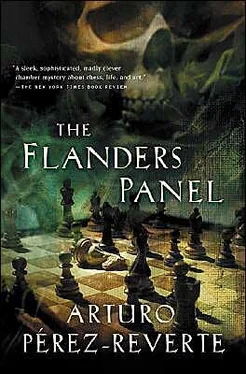“I must say,” he added with an ambivalent, almost coquettish look on his face, “that the feeling of being gradually cornered by you became genuinely exciting, really. Something… almost physical, if you’ll allow me that word. Although, admittedly, you’re not exactly my type.” He remained absorbed in thought for a few moments, as if trying to decide exactly how best to categorise Munoz, but then appeared to abandon the attempt. “With the final moves I realised that I was becoming the only possible suspect. And you knew that I knew… I don’t think I’d be wrong in saying that it was from that moment that we began to draw closer to each other. Wouldn’t you agree? The night we spent sitting on a bench opposite Julia’s building, keeping watch with the aid of my flask of cognac, we had a long conversation about the psychological characteristics of the murderer. By then, you were almost sure I was your opponent. I listened with rapt attention as you explained, in response to my questions, the relationship of the known hypotheses on the pathology of chess. Except one, of course. One that you didn’t mention until today but which, nevertheless, you were perfectly aware of. You know which one I mean.”
Munoz nodded, a calm, affirmative gesture. Cesar pointed at Julia.
“You and I know, but she doesn’t. Or at least not everything. We should explain it to her.”
Julia looked at Cesar.
“Yes,” she said, feeling tired and irritated with both of them. “Perhaps you’d better explain what you’re talking about, because I’m beginning to get thoroughly fed up with all this bloody matiness.”
Munoz kept his eyes fixed on Cesar.
“The mathematical aspect of chess,” he replied, unaffected by Julia’s ill humour, “gives the game a very particular character, something that specialists would define as anal sadistic. You know what I mean: chess as a silent battle between two men, evocative of terms such as aggression, narcissism, masturbation… and homosexuality. Winning equals conquering the dominant father or mother, placing oneself above them. Losing equals defeat, submission.”
Cesar raised one finger, demanding attention.
“Unless, of course,” he pointed out politely, “that is the real victory.”
“Yes,” said Munoz. “Unless victory consists precisely in demonstrating the paradox: inflicting defeat upon oneself.” He looked at Julia for a moment. “You were right in what you said to Belmonte: the game, like the painting, was accusing itself.”
Cesar gave him a surprised, almost joyful, look.
“Bravo,” he said. “Immortalising oneself in one’s own defeat; isn’t that it? Like old Socrates when he drank the hemlock.” He turned towards Julia with a triumphant air. “Our dear friend Munoz knew all this days ago, Princess, but didn’t say a word to anyone, not even to you or me. Finding myself conspicuous by my absence in my opponent’s calculations, I modestly assumed that he must be on the right track. In fact, once he’d talked to the Belmontes and could finally discount them as suspects, he had no further doubts about the identity of the enemy. Am I right?”
“You are.”
“May I ask you a rather personal question?”
“Ask and you’ll find out.”
“What did you feel when you finally hit on the correct move, when you knew it was me?”
Munoz thought for a moment.
“Relief,” he said. “I would have been disappointed if it had been someone else.”
“Disappointed to have been wrong about the identity of the mystery player? I wouldn’t want to exaggerate my own merits, but it wasn’t that obvious, my friend. Several of the characters in this story weren’t even known to you, and we’ve been together only a couple of weeks. You had only your chessboard to work with.”
“You misunderstand me,” replied Munoz. “I wanted it to be you. I liked the idea.”
Julia was looking at them, incredulity written on her face.
“I’m so glad to see you two getting along so well,” she said sarcastically. “If you like, later on we can all go out for a drink, pat each other on the back and tell each other what a laugh we’ve all had over this.” She shook her head, as if trying to recover some sense of reality. “It’s incredible, but I feel as if I were in the way here.”
Cesar gave her a look of pained affection.
“There are some things you can’t understand, Princess.”
“Don’t call me Princess! Besides, you’re quite wrong. I understand it all perfectly. And now it’s my turn to ask you a question. What would you have done that morning in the Rastro, if I hadn’t noticed the spray can and the card and I’d just got into that car with its tyre made into a bomb and started the engine?”
“That’s ridiculous.” Cesar seemed offended. “I would never have let you.”
“Even at the risk of betraying yourself?”
“Of course. You know that. Munoz said so earlier. You were never in any danger. That morning everything was planned down to the last detail: the disguise ready in the poky little room with its two separate doors, which I’ve been renting as a storeroom, my appointment with the dealer, a real appointment that I dealt with in a matter of minutes… I got dressed as fast as I could, walked to the alleyway, fixed the tyre, left the card and put the empty spray can on the bonnet. Then I stopped by the woman selling images to make sure she’d remember me, returned to the storeroom and, after a change of clothes and make-up, went off to meet you at the cafe. You have to admit my timing was impeccable.”
“Sickeningly so.”
Cesar gave her a reproving look.
“Don’t be vulgar, Princess.” He looked at her with an ingenuousness that was remarkable for its utter sincerity. “Using ghastly adverbs like that will get us nowhere.”
“Why take such pains to terrify me?”
“It was an adventure, wasn’t it? There had to be a hint of menace in the air. Can you imagine an adventure from which fear is absent? I couldn’t tell you the stories that used to thrill you as a child, so I invented the most extraordinary adventure I could imagine. An adventure that you would never forget as long as you lived.”
“Of that you can be sure.”
“ Mission accomplished, then. The struggle between reason and mystery, the destruction of the ghosts ensnaring you. Not bad, eh? And add to that the discovery that Good and Evil are not clearly delimited like the black and white squares on a chessboard.” He looked at Munoz before giving an oblique smile, as if in reference to a secret to which both were privy. “All the squares, my dear, are grey, tinged by the awareness of Evil that we all acquire with experience, an awareness of how sterile and often abjectly unjust what we call Good can turn out to be. Do you remember Settembrini, the character I so admired in The Magic Mountain ” He used to say that Evil is the shining weapon of reason against the powers of darkness and ugliness.“
Julia was intently watching Cesar’s face. At certain moments it appeared that only half of his face was speaking, the visible half or the half in shadow, the other there only as witness. And she wondered which of the two was more real.
“That morning when we attacked the blue Ford I really loved you, Cesar.”
Instinctively, she addressed the illuminated half of his face, but the reply came from the half that was plunged in shadow:
“I know you did. And that justifies everything. I didn’t know what that car was doing there either. I was as intrigued by it as you were. Perhaps more so, for obvious reasons. No one, if you’ll forgive the rather lugubrious joke, had invited it to the funeral.” He shook his head gently at the memory. “I must say that those few yards, you with your pistol and me with my pathetic poker, and our attack on those two imbeciles, before we found out they were actually Inspector Feijoo’s henchmen” – he gestured as if he couldn’t find words to express his feelings – “were absolutely marvellous. I watched you walking straight at the enemy, brows furrowed, teeth clenched, as brave and terrible as an avenging fury. In addition to excitement, I felt genuine pride. There’s a woman with real character, I thought, admiringly. If you’d been a different kind of person, unstable or fragile, I would never have put you to such a test. But I was sure you would emerge from this a new woman, harder and stronger.”
Читать дальше












